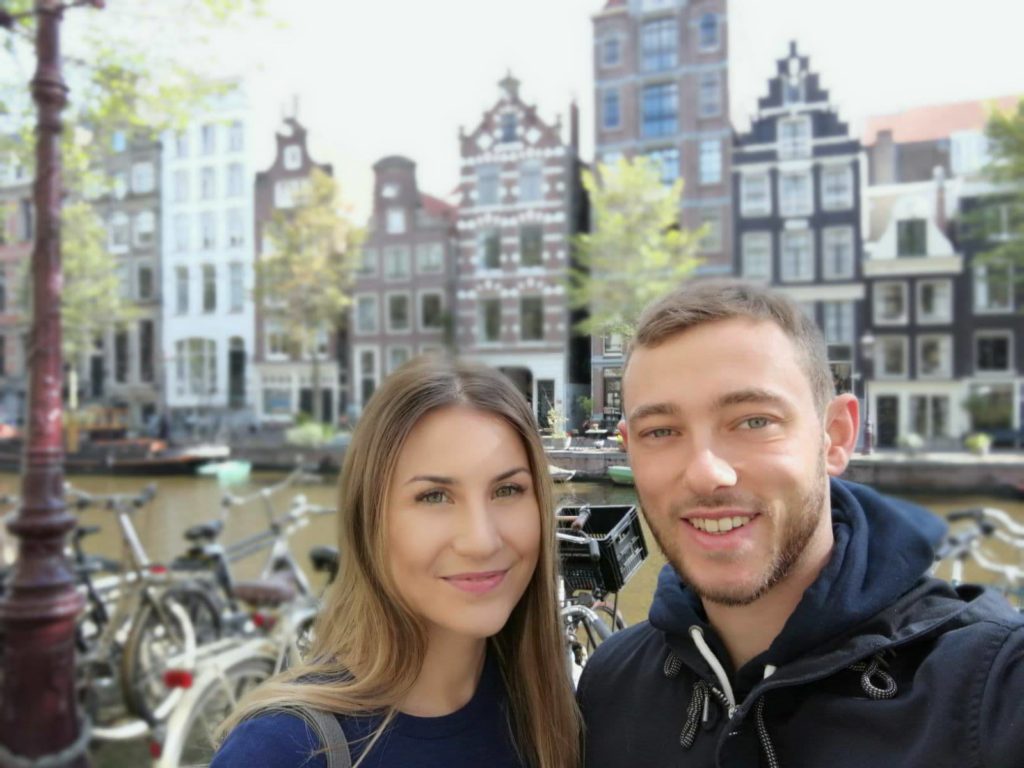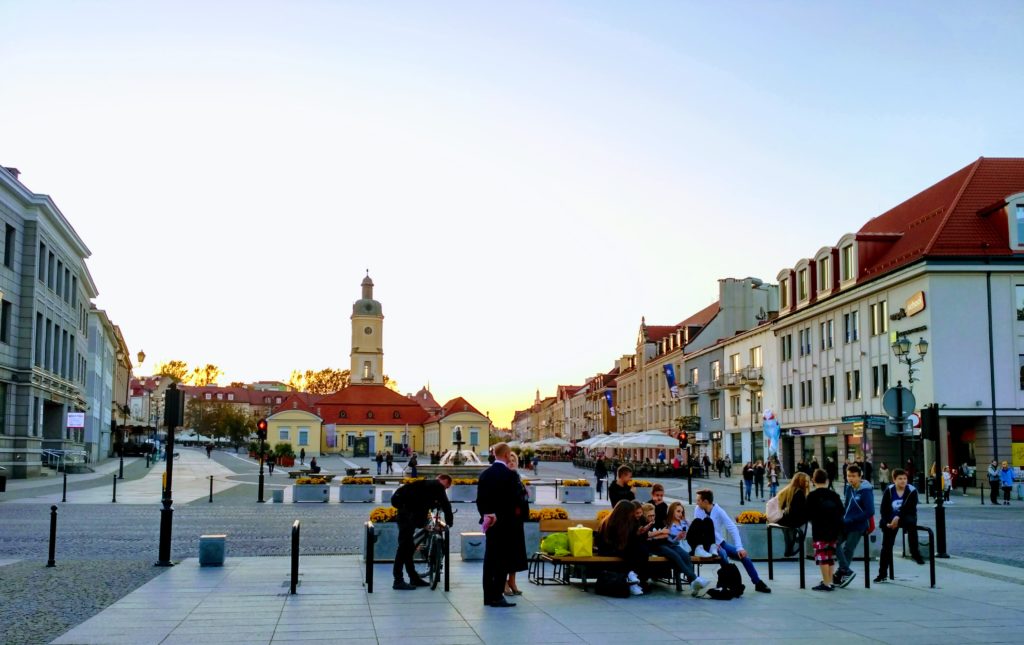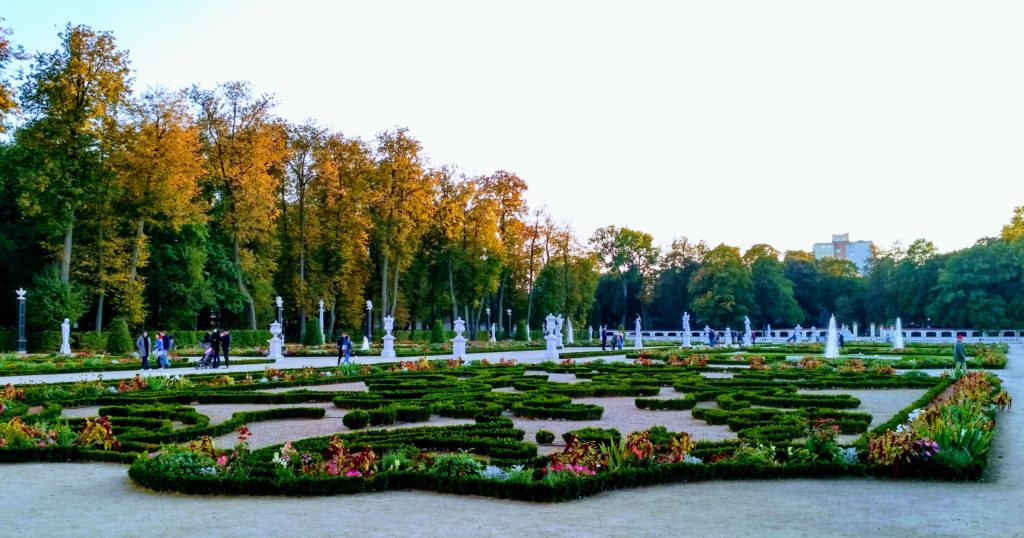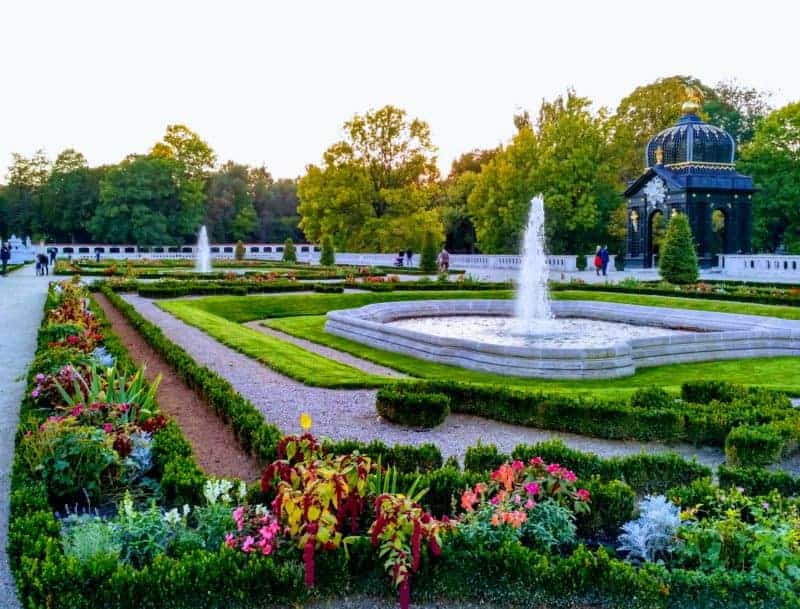When I told my friends we were going to Bialystok, Poland for the weekend, the first question was: “What are you going to buy there?” (or just after “Where is Bialystok?” from our foreign friends). Because yes, from Vilnius you would normally go to Bialystok for one day only and for shopping only. After we got euro here in Lithuania, the prices gone up. Our neighbouring country Poland kept the zloty and either because of this, or some other (unknown to me) economic reason became a shopping Mecca for Lithuanians. This is especially true for the towns near the Polish/Lithuanian border – Suwalki, Augustow and Bialystok.
That is a bit unfair, because they have so much more to offer than just shopping. But similarly to many other small Eastern European towns, this “much more” can also be a bit hidden. If you are lucky, you will see some beautiful small old town, if not so lucky – only grey Soviet blocks of flats. But it is almost impossible to feel the town and to uncover its vibe just passing by. So I had an idea. I needed someone local to show me their Bialystok. And blessed be Facebook and some luck – I found just the right people.
Monika is a true local, born, raised and still living in Bialystok, after having travelled quite extensively. Her boyfriend Pier is half-Italian half-British from Bristol, and has recently relocated to Bialystok – a very uncommon relocation direction, as you still have more Poles relocating to the UK. But after hearing them speak about this place and me writing about it, who knows – maybe his unusual move will become a new trend?

I noticed that when I write my articles and publish them, I usually do not keep all the details in my head. But there is always a phrase or a little sentence that sticks and I remember it almost exactly even several months later. When Monika spoke about the concept of fatherland, her words rang in my heart and they still do. It was one of the last things she said and I also put it last in the text, because I want you to close this browser window with those two sentences ringing in your heart too.
So, without further ado, I pass the word to Monika and Pier. Let them take you on a little tour around Bialystok, Poland.
Table of Contents
Monika and Bialystok
I couldn’t really move to England. And I’m not even sure if I should. It’s not bad living here.
I could live somewhere else, also in a bigger city. But Warsaw is not something for me. London, Warsaw, those big cities are too much for me: too many people, too much going on. I could live in Krakow for example.
Krakow is a bit like Bristol, a similar city. I don’t have driving license, so for me living in such a big city would be a problem.
Pier getting stuck in Bialystok
I moved to Bialystok from the UK, although usually it would be other way around. I’ve been coming here for two years now for a week, two weeks almost every month. So you could say I’ve already been living here part time. I just moved recently though. It’s not bad here, I like it.
I come from a big city in Britain, and Bialystok is much smaller. It’s more relaxed, less people, no traffic. Everyone is more laid back and easy.
When I was still travelling between Bristol and Bialystok, I missed a couple of flights home from here. If something can happen, it will not happen to anyone else. It will happen to me.
Once I went from here to Warsaw airport by bus. Sat for four hours on a bus, got to the airport, looked underneath, where I had left my luggage and saw that someone else left a red suitcase and took mine by mistake in the city centre. I had my passport and my phone on me, but everything else was in my bag. I only could go back, so I ended up sitting for eight hours on a bus for nothing. They delivered the bag to Bialystok a couple of days later.
So I tried leaving next day. Monika booked me another bus ticket, but she totally forgot that this was a national day. So the whole Warsaw was just blocked by traffic. I got to the train station one hour and a half after my plane left. So again I just had to go back.
Eventually I got home to Bristol, but this was how I figured out it was easier to just move over here. I was just stuck in Bialystok.
Bialystok town now and then
Monika: Before the war the town was very different. The Jewish population was 20%, 20% of Russians, 20% of Polish. The rest – Germans, Lithuanian, others. Very multicultural. And the main language was Russian.
The old town is not really old. It looks old, but in reality it is rather new. Bialystok used to be all wooden before.
Now there are not so many Russians coming here, because geographically it is far away. But there are many from Belarus.
Pier: Western Europe now is a bit more like America. We work so much that there is no time for family, no time for leisure. You have to earn money to pay the morgage, to afford more stuff. And it’s sort of a sad mentality. Here people do not really push themselves that much.
I’ve got a friend who is from Warsaw. He moved here to raise his daughter. He visited Bialystok a couple of times, and he decided it is a good place for children. It is more traditional than Warsaw and safer. Many people here still go to church every Sunday (although we don’t). People cook their food at home, instead of getting a take-away or eating out. In a way it is more old-fashioned, kind of like living in England 10 years ago. And it’s nice. Instead of running all the time, being busy all the time, I came here to slow life, home cooking.
You have everything you need in Bialystok. You have parks, shops, restaurants, libraries. But you don’t have airport. The closest ones are Kaunas, Vilnius and Warsaw. You need at least four hours to get to any of them, plus two extra hours to spend in the airport. That means that my journey to Bristol took all in all 12 hours, although it is only two hours flight.
Winters in Bialystok
Pier: It does get too cold for me. But unlike England, where you have to be prepared for any kind of weather any day, at least there is stability, when it’s cold – it’s cold. The funny thing is that here when it snows and is -10 C, people just carry on as if nothing has happened.
Monika: Because nothing has happened.
Pier: In the UK you would shut down the whole country. And the kids are allowed to play in the snow instead of going to school. Anyway, I’m planning to stay inside, when it snows.
Monika: I don’t remember not going to school because of the weather. The school is always open. I remember though that some 15 years ago winters were much colder than now. Now it is maybe one month of snow and cold, but not as bad as it was then. For me the worst in the UK is wind. I don’t care even if it’s -30 C here, as long as there is no wind and rain.
Pier: Last winter I was here and it was -20 C. First time in my life I saw that the car could not start because of the cold. And I froze so much in my jeans. Then I found out I was supposed to wear some kind of men’s tights on. I came wearing a big winter coat, and Monika asked me: “Where is your winter coat?”. And it was my winter coat. Then I realised it is a coat for September in Poland, and I had to buy a proper one.
Monika: Last year I was working with some Erasmus students from Gran Canaria. They asked me: “Do we have to go to the University, if it snows?” And they were serious. I didn’t know even what to say to them – it snows most of the winter. But eventually they loved the snow, it just took some time getting used to.
Racism in Bialystok
Monika: There is also a lot of talk about racism in Bialystok. I lived here all my life, and honestly I have never encountered anyone offending anyone because of the skin colour, race or something like that. I heard about it of course, but only on a couple of occasions.
We don’t have a lot of tourists in Bialystok, and even those we have usually come from the region, like Belarus, Ukraine, Lithuania, Germany. In the UK you have all those mixed neighbourhoods, but here people are… well, Polish. They are not used to seeing foreigners around, and when they do, they are more curious than racist.
People of Poland think that Bialystok is the most racist city in Poland. They think that based on one book written by one man, which is called “Bialystok”. I read it myself. If you have never been here and you just read this book, then you are going to think: “What the hell is going on in that place?” And you won’t even want to visit it. We have this saying: “The shit always floats on the surface” – and in this case it is exactly what happens. If a couple of racists do something or say something, this is what you gonna hear about, not the normal people.

Pier: Exposure to culture is changing that. I am half Italian and I can see that Italy was more racist 30-40 years ago. And then many people came from other countries, and settled down and gradually the locals got used to it and recognized them as Italian. Eventually it might happen here too.
I’m an English man living in Poland and I never had a problem. Most people I meet are generally friendly curious: “What are you doing here?”
Jobs in Bialystok
Pier: I am trying to find some work online, just to keep myself busy. I’m an electrician.
Monika: I remember Pier asking me, if he could find a job as an electrician here. I asked him, how many people from Poland used to work with him in Bristol? That was my answer: it is not really the right direction for an electrician to go to.
Outside the city you will have agriculture. There are many IT companies, otherwise we got a bit of everything. It’s not really a touristic place, so there are not many hotels. Now there are many Lithuanians coming here for shopping. Since the euro they keep coming here. I remember before we would go to Vilnius and some things would be cheaper there than here. The same in Slovakia, I have a friend there and it got much more expensive.

Pier: As an English speaker you can’t really find a job in Bialystok. There are no English companies, no international jobs. You can only teach English.
Polish Language
Pier: For me Polish language is the opposite of English. Just the consonants and sh zh sh zh. I can already follow a simple conversation for the first five minutes. Then it gets too fast and I get tired and tune out.
Monika: The students who come here often don’t want to learn the language. One of the reasons to come here is because Poland is cheap, so you can have a good time for a year and spend little money. Another reason is, well, because they also think that girls in this part of Europe are easy.

Pier (pointing at Monika): They are not. Believe me, the last years were nothing but easy.
I think many Westerners see the map of Europe the way it was many years ago. So they expect people to still speak Russian in this part of the world.
Seasonal parties in Bialystok
In the summer on any single night all the bars will be busy. It has a lot to do with the weather. If it’s raining, there will be no one outside. And in the winter it is mostly empty even at 8 pm.
Differently from the UK, where you go out, here people also party at home a lot. You usually would have a pre-party, and sometimes it will get so good, that you are not even leaving anywhere after all.

There is also an English pub, but funnily enough, the people who work there don’t speak any English.
Life in Bialystok is concentrated around the city centre. There are neighbourhoods that are more prestigious, or less safe, but normally people would just sleep there and come for the life to the centre.
The prices are lower here, but so are the salaries.
Local food and drinks
Monika: The local food is potatoes in all possible variations, usually served with cabbage and meat. Herring with vinegar and onion. You have dumplings filled with anything you fancy: any kind of meat, vegetables, potatoes, even fruits. Many heavy soups – something to keep you warm during the winter. And speaking of the restaurants around: we have some Italian, Indian, Chinese, but mostly Polish. I think we just like eating what we know.
The best place to have chocolate is Wedel (Rynek Kościuszki street 17). There you can drink it, eat it, have it as a cake, as a mousse, as anything.
I also like it in the centre, when they have a market. There will be wine, local cheese and meat, some sweets and entertainment for children. For the Christmas market there will be mulled wine and warm beer. I also make the beer at home sometimes. You just mix the beer with some cinnamon, spices, some honey. Heat it up. If you have a cold, it will really help you to recover.
Pier: Despite all this great food and beers here, there are things I miss from home. Especially cider, baked beans and vinegar crisps. I try to bring some of it every time I travel to Bristol.
Speaking of favourite places, one of them is definitely the Palace. Especially on a winter night. You would have the Christmas tree, the lights on the Palace and all the snow around. It is beautiful.
Nationalism
Monika: You should be proud of your country, but not too much. My grandfather said: “You should ask me what the real nationalism is and where it can lead you.” So I am a bit afraid, not only for Poland, but also for Europe. When our grandparents pass away, it will all start all over again.
We recently realised that both of us learned in school that it was our country which won the war. And I start to think that everyone has learned that – that they have won.
One of my grandmothers was born in a village near Vilnius. For her this place was Poland, but most importantly, her fatherland. She knows of course that it is another country – Lithuania – now. Or maybe Belarus actually, because it was close to the border – we are not sure. My other grandmother was born near Lviv, which is now Ukraine. So, they both know those are different countries. And they do not want to claim the territory or to take it back. But they want to call it their fatherland.
Liked the post? Pin it!








Sort of men’s tights. lol.
Yes, thanks for putting the consequences of nationalism on paper. I agree, it is important not to forget.
I lived in Bialystok many years ago (1993) and I loved the place. I’m Australian and I spent the winter there. The climate was unlike anything that I’s ever seen. I found the people to be very friendly I mainly was hanging out with students and drinking beer and vodka. I’ve lost contact with almost everyone I knew over the years but the experience of living there will stay with me the rest of my life.
🙂 Sounds like a proper life in Bialystok. I can believe that the climate is very different from the one in Australia!
What a Blis! I travelling to Białystok on the 14 th of September and reading about it here and using my past and wonderful experience in Poland and the kindness and help of the Polish people, I already feel welcome, I already feel at home.
Poland is just an amazing welcoming place to everyone, and one of the fastest developing countries may God bless them and the people behind the good work. It was indeed true what I read before my first trip to Poland “Krakow ” that Poland is one of the safest venues in Europe!!.
I have been to Poland more than 6 times now, and everytime i go there my addiction and l9ve with this Golden Star of a country and Nation increases! May God bless it.
Beautiful pictures and a really interesting read!
Thank you Charlie!
Interesting article. However, I would never call Bialystok a town. According to the Polish government info (as of 2019), in terms of its size, Bialystok is the 9th biggest city in the Republic of Poland.